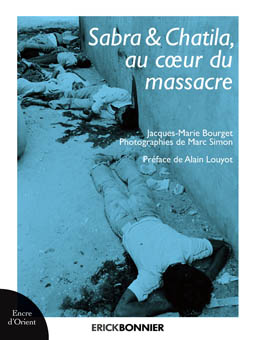AU COEUR DU MASSACRE
MARC SIMON
Textes JACQUES-MARIE BOURGET
Editeur : Éditions Érick Bonnier, collection Encre d’Orient
Année de parution : 2012
ainsi lorsque l’on s’intéresse de près à la scène israélo-palestinienne, théâtre de toutes les passions. Car rien n’est simple pour un journaliste lorsqu’il s’agit de témoigner de la rivalité des descendants d’Abraham et d’ausculter les convulsions de leur terre trop souvent promise. Pourtant, Jacques-Marie Bourget qui a toujours accepté d’affronter les risques inhérents à son métier de grand reporter et en porte la marque dans sa chair, a pris celui de revenir sur ce sujet tabou : les massacres des camps de Sabra et Chatila en 1982 au Liban alors envahi par l’armée israélienne.
Trente ans après cette tragédie dont les auteurs restent impunis, ce journaliste qui fut grièvement blessé en octobre 2000 en Cisjordanie a voulu rompre le silence assourdissant qui fait insulte à la mémoire des centaines de civils palestiniens abattus, méthodiquement et à bout portant, dans la banlieue de Beyrouth. Ceux qui veulent réécrire l’Histoire pour mieux l’enterrer vous diront que tout cela aurait été exagéré à l’époque par les médias ou même inventé de toutes pièces. Pour avoir été moi-même, en tant qu’envoyé spécial du newsmagazine Le Point, parmi les premiers journalistes qui sont entrés, ce funeste 18 septembre, dans ces pauvres ruelles et bicoques jonchées de cadavres parfois atrocement mutilés – nombre d’entre eux étaient ceux de femmes et d’enfants dont je n’oublierai jamais le dernier regard horrifié – je peux témoigner que ce cauchemar, oeuvre manifeste des milices chrétiennes libanaises, a bien eu lieu toute une nuit durant à quelques centaines de mètres seulement de blindés israéliens en faction… Pour le reste, j’avoue ne pas en avoir appris beaucoup plus depuis, et de façon précise, sur les méandres de la piste sanglante que Jacques-Marie Bourget a remontée.
Mais j’ai la conviction qu’Israël et le Liban, deux pays dont j’ai si souvent partagé les épreuves et qui, tous deux, me sont chers, s’honoreraient à faire un jour toute la lumière sur cette ténébreuse affaire. L’apaisement et la réconciliation, Nelson Mandela, le père de la nation arc-en-ciel, nous l’a montré, passent nécessairement par la recherche de la vérité.
Albert Londres, précurseur du reportage moderne, disait que le rôle du journaliste est de « tremper sa plume dans la plaie ». Voilà qui est fait au moment où celle, immonde pour notre civilisation, de Sabra et Chatila commence à se refermer dans les oubliettes de l’Histoire.
Alain Louyot
Ancien grand reporter au Point et rédacteur en chef « Monde » à L’Express.
Lauréat et membre du jury du prix de journalisme Albert Londres
SABRA & CHATILA
Marc SIMON
No need to be an oracle nor a palm-reader to realise that this book would be likely to stir up some controversy. It is always so when anyone starts to look closely the highly emotive subject of Israeli-Palestinian affairs. Nothing is easy for a journalist who wants to record the rivalry amongst Abraham’s descendants and to analyse the convulsions of their much- and over-promised land. Undeterred, Jacques-Marie Bourget, who has always accepted the risks inherent in the job of special correspondent – he bears the wounds to prove it – has taken another risk here in revisiting another taboo: the massacres in the Sabra and Chatila camps in Lebanon, during the invasion by the Israeli army in 1982.
Thirty years after this tragedy, whose protagonists still go unpunished, this journalist wanted to break the deafening silence which does dishonour to the memory of the hundreds of Palestinian civilians who were methodically shot, at close range, in the suburbs of Beirut. He himself was seriously injured in the West Bank in 2000. Those who would wish to rewrite history, the better to bury it, would tell you that the media greatly exaggerated it all at the time, or even that it was pure fiction. Having been there myself as special correspondent for the Le Point news magazine, and having been one of the first journalists that fateful September 18 to explore those poor little streets and houses strewn with bodies – occasionally horribly mutilated, many of them of women and children whose last horrified gaze I will never forget – I can attest that that nightmare went on all night, apparently perpetrated by Lebanese Christian militia, only a few hundred metres from the Israeli armoured vehicles that were posted there…. As for the rest, I admit that I have not learned much more since then of the bloody chain of events that Jacques-Marie Bourget has investigated.
But I am convinced that Israel and Lebanon, two countries close to my heart and whose tribulations I have often shared, would do honour to themselves by one day bringing that dark chapter of their history into the light.
Nelson Mandela, the father of the rainbow nation, has shown us that a search for truth is key to achieving peace and reconciliation.
Albert London, a forerunner of modern journalism, said that the role of the journalist is to “dip his pen in the ink of the wound”. So here it has been done, just at the moment that the wounds of Sabra and Chatila were beginning to close over in the oblivion of time. Alain Louyot
Former special correspondent at Le Point and editor of the World News section at l’Express magazine.
Winner and member of the jury of the Albert Londres prize for journalism.

Lettre d’information
75004 Paris – France
+33 (0)1 42 74 26 36
ouverture du mercredi au samedi
de 13h30 à 18h30. Entrée libre
M° Rambuteau – Les Halles
Pour Que l’Esprit Vive
20 rue Lalande
75014 Paris – France
T. 33(0)1 81 80 03 66
www.pqev.org

